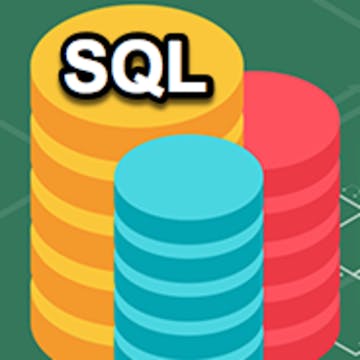
Grande parte dos dados do mundo reside em bancos de dados. SQL (ou Structured Query Language) é uma linguagem poderosa usada para se comunicar e extrair dados de bancos de dados. Um conhecimento prático de bancos de dados e SQL é essencial se você deseja se...
Read more
Three deals to help you save


Good to know
Save this course
Reviews summary
Practical sql mastery for data science
Activities
Read 'SQL for Data Analysis' by Allen Downey
Show steps
This book provides a comprehensive overview of SQL and its applications in data analysis, which will supplement and reinforce the concepts covered in the course.
View
Think Bayes
on Amazon
Show steps
-
Read the book's chapters and work through the exercises.
-
Take notes and highlight important concepts.
Join a Study Group
Show steps
Engage with peers to clarify concepts, share insights, and enhance your learning through collaborative discussions.
Show steps
-
Find or create a study group with fellow learners.
-
Meet regularly to review course materials, discuss exercises, and prepare for assessments.
-
Share knowledge, perspectives, and resources with the group.
Build a database structure
Show steps
Get hands-on practice building a database structure to reinforce and apply your understanding of database concepts.
Show steps
-
Choose a project scope and define the data requirements.
-
Create tables and define columns with appropriate data types and constraints.
-
Establish relationships between tables using foreign keys.
-
Insert sample data to populate the database.
Nine other activities
Expand to see all activities and additional details
Show all 12 activities
Use SQL to Query Data
Show steps
Strengthen your SQL skills by following guided tutorials on data querying and manipulation.
Browse courses on
SQL Queries
Show steps
-
Identify the tutorials that align with your learning goals.
-
Follow the instructions to create queries and extract data.
-
Practice writing different types of queries, such as SELECT, WHERE, and JOIN.
Practice SQL queries on sample databases
Show steps
This activity will help you solidify your understanding of SQL syntax and data retrieval.
Browse courses on
SQL
Show steps
-
Choose a sample database that is relevant to your interests.
-
Write SQL queries to retrieve specific data from the database.
-
Test your queries and refine them as needed.
Follow online tutorials on SQL from reputable sources
Show steps
These tutorials will provide additional practice and guidance on specific SQL concepts and techniques.
Browse courses on
SQL
Show steps
-
Identify and select reputable tutorials from online platforms or documentation.
-
Follow the tutorials step-by-step and complete any exercises.
-
Take notes or summarize the key takeaways.
Join a study group or participate in online forums
Show steps
Engaging with peers can provide valuable insights, foster collaboration, and clarify concepts.
Browse courses on
SQL
Show steps
-
Join online discussion forums or study groups related to SQL.
-
Participate in discussions, ask questions, and share knowledge.
Attend workshops or online events focused on SQL
Show steps
Workshops and events provide opportunities for in-depth learning, networking, and exposure to industry experts.
Browse courses on
SQL
Show steps
-
Identify relevant workshops or online events.
-
Register and attend the events.
-
Engage with speakers, ask questions, and learn from others.
Create a SQL cheat sheet or reference guide
Show steps
This activity will help you consolidate your knowledge of SQL commands and syntax, making them easily accessible for quick reference.
Browse courses on
SQL
Show steps
-
Compile a list of essential SQL commands and their usage.
-
Organize the commands into a logical structure.
-
Format the cheat sheet visually for easy readability.
Develop a Data Analysis Project
Show steps
Apply your SQL and data analysis skills to a practical project, solidifying your understanding and showcasing your abilities.
Browse courses on
Data Analysis
Show steps
-
Define the project scope and objectives.
-
Collect and prepare the required data.
-
Perform data analysis using SQL queries and visualizations.
-
Create a report or presentation to summarize your findings.
Solve coding challenges involving SQL queries
Show steps
These challenges will test your problem-solving skills and ability to apply SQL concepts in practical scenarios.
Browse courses on
SQL
Show steps
-
Find coding challenges on platforms such as LeetCode or HackerRank.
-
Analyze the problem and identify the data retrieval requirements.
-
Write efficient and optimized SQL queries to solve the challenges.
Build a data analysis project using SQL
Show steps
This project will provide you with hands-on experience in applying SQL skills to real-world data analysis tasks.
Browse courses on
SQL
Show steps
-
Identify a dataset and define a problem statement.
-
Explore the data using SQL queries and visualizations.
-
Develop insights and draw conclusions from the data analysis.
Read 'SQL for Data Analysis' by Allen Downey
Show steps
This book provides a comprehensive overview of SQL and its applications in data analysis, which will supplement and reinforce the concepts covered in the course.
View
Think Bayes
on Amazon
Show steps
- Read the book's chapters and work through the exercises.
- Take notes and highlight important concepts.
Join a Study Group
Show steps
Engage with peers to clarify concepts, share insights, and enhance your learning through collaborative discussions.
Show steps
- Find or create a study group with fellow learners.
- Meet regularly to review course materials, discuss exercises, and prepare for assessments.
- Share knowledge, perspectives, and resources with the group.
Build a database structure
Show steps
Get hands-on practice building a database structure to reinforce and apply your understanding of database concepts.
Show steps
- Choose a project scope and define the data requirements.
- Create tables and define columns with appropriate data types and constraints.
- Establish relationships between tables using foreign keys.
- Insert sample data to populate the database.
Use SQL to Query Data
Show steps
Strengthen your SQL skills by following guided tutorials on data querying and manipulation.
Browse courses on
SQL Queries
Show steps
- Identify the tutorials that align with your learning goals.
- Follow the instructions to create queries and extract data.
- Practice writing different types of queries, such as SELECT, WHERE, and JOIN.
Practice SQL queries on sample databases
Show steps
This activity will help you solidify your understanding of SQL syntax and data retrieval.
Browse courses on
SQL
Show steps
- Choose a sample database that is relevant to your interests.
- Write SQL queries to retrieve specific data from the database.
- Test your queries and refine them as needed.
Follow online tutorials on SQL from reputable sources
Show steps
These tutorials will provide additional practice and guidance on specific SQL concepts and techniques.
Browse courses on
SQL
Show steps
- Identify and select reputable tutorials from online platforms or documentation.
- Follow the tutorials step-by-step and complete any exercises.
- Take notes or summarize the key takeaways.
Join a study group or participate in online forums
Show steps
Engaging with peers can provide valuable insights, foster collaboration, and clarify concepts.
Browse courses on
SQL
Show steps
- Join online discussion forums or study groups related to SQL.
- Participate in discussions, ask questions, and share knowledge.
Attend workshops or online events focused on SQL
Show steps
Workshops and events provide opportunities for in-depth learning, networking, and exposure to industry experts.
Browse courses on
SQL
Show steps
- Identify relevant workshops or online events.
- Register and attend the events.
- Engage with speakers, ask questions, and learn from others.
Create a SQL cheat sheet or reference guide
Show steps
This activity will help you consolidate your knowledge of SQL commands and syntax, making them easily accessible for quick reference.
Browse courses on
SQL
Show steps
- Compile a list of essential SQL commands and their usage.
- Organize the commands into a logical structure.
- Format the cheat sheet visually for easy readability.
Develop a Data Analysis Project
Show steps
Apply your SQL and data analysis skills to a practical project, solidifying your understanding and showcasing your abilities.
Browse courses on
Data Analysis
Show steps
- Define the project scope and objectives.
- Collect and prepare the required data.
- Perform data analysis using SQL queries and visualizations.
- Create a report or presentation to summarize your findings.
Solve coding challenges involving SQL queries
Show steps
These challenges will test your problem-solving skills and ability to apply SQL concepts in practical scenarios.
Browse courses on
SQL
Show steps
- Find coding challenges on platforms such as LeetCode or HackerRank.
- Analyze the problem and identify the data retrieval requirements.
- Write efficient and optimized SQL queries to solve the challenges.
Build a data analysis project using SQL
Show steps
This project will provide you with hands-on experience in applying SQL skills to real-world data analysis tasks.
Browse courses on
SQL
Show steps
- Identify a dataset and define a problem statement.
- Explore the data using SQL queries and visualizations.
- Develop insights and draw conclusions from the data analysis.
Career center
Data Analyst
Database Administrator
Data Scientist
Data Engineer
Software Engineer
Risk Manager
Epidemiologist
Forensic Accountant
Market Researcher
Health Data Analyst
Data Journalist
Business Analyst
Statistician
Quantitative Analyst
Actuary
Reading list
Share
Similar courses
OpenCourser helps millions of learners each year. People visit us to learn workspace skills, ace their exams, and nurture their curiosity.
Our extensive catalog contains over 50,000 courses and twice as many books. Browse by search, by topic, or even by career interests. We'll match you to the right resources quickly.
Find this site helpful? Tell a friend about us.
We're supported by our community of learners. When you purchase or subscribe to courses and programs or purchase books, we may earn a commission from our partners.
Your purchases help us maintain our catalog and keep our servers humming without ads.
Thank you for supporting OpenCourser.


